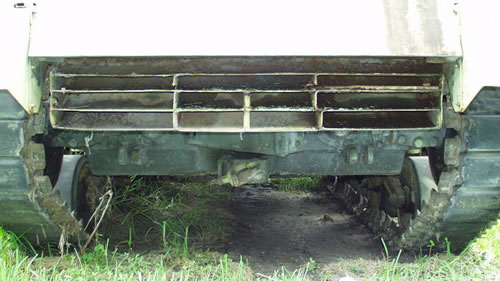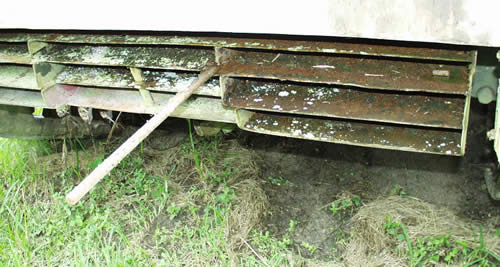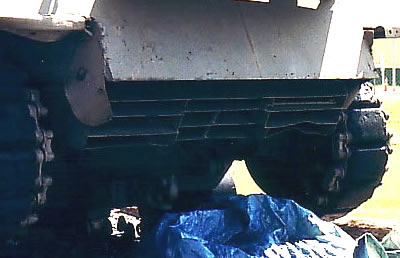by Mike
Canaday
The
main purpose of the deflector was to keep road dust down to prevent
artillery from spotting moving tanks. This apparently wasn't perceived
as a problem until the tanks got into combat, hence the early Sherman
designs (M4, M4A1, M4A2, and M4A4) lack deflectors and later revisions
all had them. It appears the lever that swung out from the center
of the grill was used to maneuver the deflector up and down. It
was either folded up and propped out of the way to access the engine,
or it was folded down.
The
basic Tamiya part (B42) found in the M4A3 kit suffers from excessively
thick sections. The advantage to using the kit part is that the
interior curve of the louvers is captured. The quickest solution
to a decent looking deflector is to thin the plastic louvers down
until the have the appearance of the sheet metal used on the real
deflector.
The
Kit Deflector
| This
shows what is wrong with the kit part, and why the decision
was made to modify it rather than build a new one from scratch.
The louvers are extremely thick, nearly 3/4 of a scale inch,
and look it. The part does have the advantage of actually having
the curved inner surfaces of the real deflector. A simple thinning
operation all that is really needed. |
 |
The
Real Deflector


The
next four photos are of the Ft. Knox M4A3 75mm wet stowage tank,
shot by Mike Foncannon.
| An
excellent shot of the prop. The clip is barely visible at the
far end. |
 |
| Detail
of the prop knuckle and the deflector construction. |
 |
 |
 |
|
Right
side shot of the deflector showing the pivot.
|
Underneath
the rear hull plate from the left hand side. |
Thinning
and Casting New Deflectors
 |
| The
plastic Tamiya part would look like this after a rework. |
 |
| The
four stages from unmodified part (lower right) to finished casting
(upper right) are shown here. After thinning down the very thick
sections, a mold was made and the castings were used for models
being constructed. |
| The
finished resin casting with the prop added. |
 |
| The
cast part as installed on the Tamiya M4A3. The kit is missing
the rear sand shield support and the plate between the rear
hull plate overhang and the lower hull rear. |
 |
| A
fairly banged up deflector on the M4A3 at Ft. Snelling. |
 |
|
























